
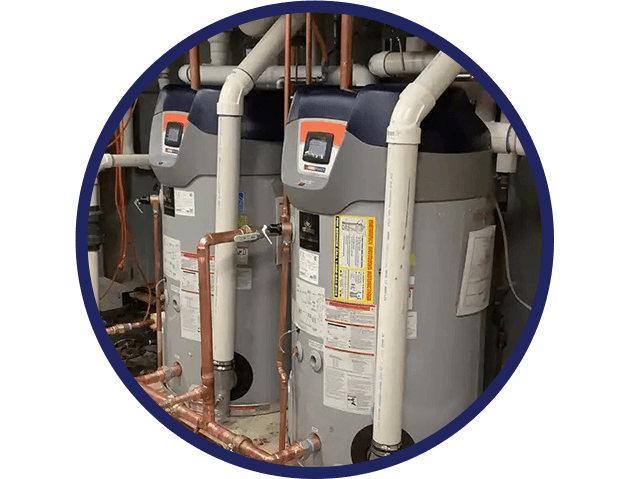
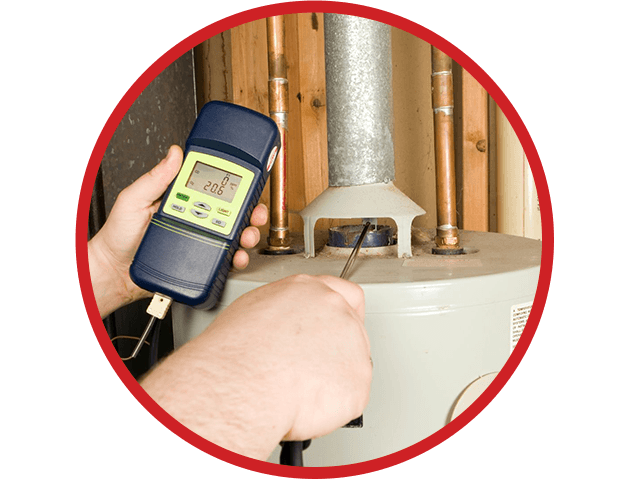
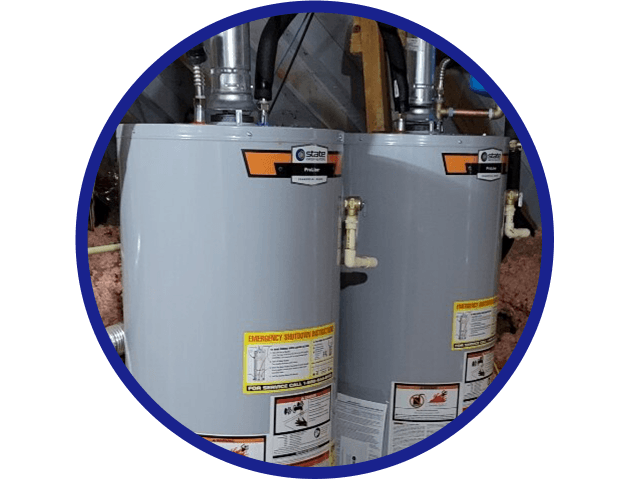
Your Questions, Our Answers.
-
What’s the Difference Between Conventional and Tankless Water Heaters?
Conventional water heaters are defined by their signature tanks. These tanks are used to pre-heat and maintain a ready-to-go supply of hot water. This means that they can provide hot water immediately whenever it’s needed, but it also means that that reservoir can run out, leaving you without heated water.
Tankless hot water heaters, as the name implies, lack a tank, and thus cannot maintain a reservoir of pre-heated water. Instead, they use heat transfer technology to heat water as it moves through your pipes. While it takes a bit longer for tankless water heaters to heat water and deliver it to your appliances and fixtures, once your water is hot, it will stay hot as long as you need it to — there’s no limited supply that you have to worry about exhausting.
-
Do I Need a Specialized Technician to Service My Commercial Water Heater?
Commercial water heaters can come in either tank or tankless varieties but are almost always designed to operate at a much larger scale. Depending on the type of commercial property they service, commercial water heaters may need to provide water to specialized equipment or enough fixtures to stock multiple homes or offices.
If commercial hot water heaters are just larger versions of their residential counterparts, can they be serviced by the same technicians? We wouldn’t recommend it. These water heaters are often hooked up to intricate and specialized plumbing systems that require experience to navigate. Plus, with their large size, commercial water heaters require extra skills to handle and clean thoroughly. We recommend that you always get your commercial water heater services from a team with experience working with these specialized pieces of equipment.
-
Why Do I Keep Running Out of Hot Water?
If your water turns cold or lukewarm in the middle of your task, or if you experience flashes of cold water in your hot shower, you may be wondering what the cause of the issue is. The most likely explanation is that you’re using hot water faster than your water heater can generate it. This can happen if you’re using multiple appliances and fixtures at once, and it’s especially likely if your water heater is malfunctioning or worn down.
So what kinds of issues can cause you to run out of hot water faster than usual? First, there’s your heat source. In a conventional water heater, this is probably your pilot light, while in a tankless water heater, this would be your heat exchanger. If your heat source is faulty, it’s harder for your unit to heat water. Another likely culprit is sediment buildup in a conventional water heater, which takes up valuable space in your tank and can even clog up your pipes and affect your water pressure.
At the end of the day, there are a lot of issues that can cause you to run out of hot water faster and more frequently, and not all of them are things you can diagnose and resolve on your own. If running out of hot water has become a common problem, call our hot water heater specialists to get your unit fixed.

work with a team of professionals!
Locally Owned and Operated
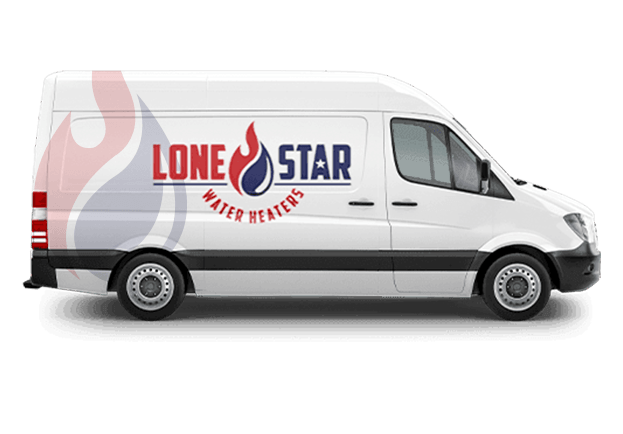
-
Emergency Services Available
-
Detail Oriented & Professional
-
Customer Care Focused
-
Quality Material & Products
The Benefits of Installing a New Water Heater
- Energy efficiency: Modern water heaters are designed to be more energy efficient. Lower utility bills can immediately help you start recouping some of the costs of the initial installation.
- Improved performance: New water heaters offer faster heating times and a more consistent supply of hot water, which can enhance your comfort and convenience.
- Space-saving designs: Newer models, especially tankless options, can free up space in your home, providing you with more flexibility for storage.
- Enhanced safety features: Modern water heaters typically come equipped with advanced safety features, reducing risks such as scalding and gas leaks.
- Eco-friendliness: New units are built to comply with current environmental standards, potentially reducing your carbon footprint.
- Increased home value: An updated water heater might be an attractive selling point, adding value to your home and appealing to potential buyers.
- Advanced technology: Many modern water heaters include smart technology, allowing you to control and monitor your unit remotely.
- Customizable options: With a variety of sizes and types available, you can choose a water heater that perfectly fits your home's needs and usage patterns.
- Warranty protection: The work we do at Lone Star Water Heaters is backed up with strong warranty protection for your peace of mind.
Call us at (888) 904-4239 for water heater services near you. We offer 24/7 availability and emergency service.
-
"Excellent, affordable, and speedy service!"I would definitely recommend them to anyone!- Emily M.
-
"Doesn’t get any better than that!"Less than 24 hours, problem solved by a friendly, knowledgeable professional who does impeccable work and left my garage area cleaner than when he started!- Pat P.
-
"They are very professional!"I highly recommend this company!- Jade S.
-
"They are efficient and know exactly what they're doing."I would highly recommend Lone Star Water Heater for your water heater needs.- Annaliese R.
-
"Dylan was incredibly efficient, knowledgeable, and kind!"We will definitely be using them again.- Kate G.
-
"Hands down the best repair business!"If you are looking for a honest, reliable, respectful, knowledgeable and trustworthy company this is definitely the one.- Hope P.
-
"I am very pleased."Great, fast service with a fair price.- Minkey
-
"Dylan is exceptional."He quickly identified the issue with our water heater and resolved it efficiently, ensuring everything was fixed perfectly. Highly recommend requesting him from Lone Star.- Susyn M.
The Signs Your Water Heater Is Damaged
- Inconsistent water temperature: If your shower starts hot and then suddenly turns cold, your water heater might be struggling to maintain a steady temperature. This could be due to sediment buildup or a failing heating element.
- Strange noises: Rumbling or popping noises coming from your water heater are often a sign of mineral buildup. These sounds indicate that your unit is working harder than it should, which could lead to premature failure.
- Leaks around the unit: Puddles or moisture around your water heater are a clear indication of a problem. Leaks can stem from a variety of issues, such as loose connections or a corroded tank, and should be quickly addressed to prevent water damage to your property.
- Rusty water: Discolored or rusty water flowing from your taps points to corrosion inside your water heater. This could lead to leaks.
- Reduced hot water supply: If you notice your hot water running out faster than usual, your water heater's capacity may be compromised due to sediment or an aging unit.
- Foul odors: A rotten egg smell in your hot water can indicate bacterial growth inside the tank. This is often the result of a failing anode rod.
- Higher energy bills: If your energy bills go up for no apparent reason, the cause could be an inefficient water heater that is working harder to do the same job.
- Pilot light issues: If your water heater's pilot light keeps going out, there may be a problem with the thermocouple or gas valve, affecting your unit's ability to function effectively.
- Visible rust on the tank: Rust on the outside of your tank is a sure sign of decay, suggesting that the integrity of the unit is compromised.
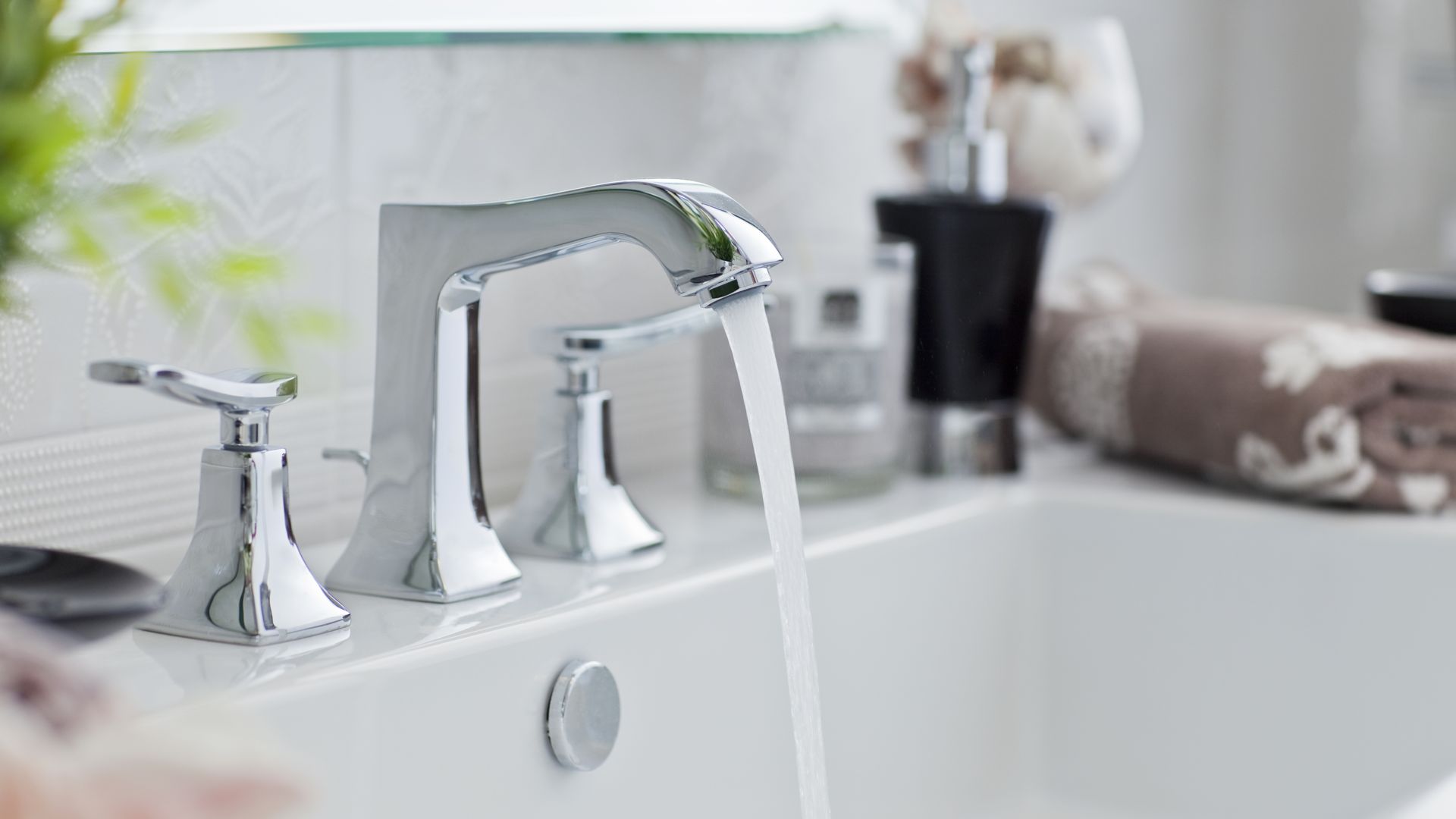
.2502180200462.jpg)
.2411210147490.jpg)
.2409271344260.jpg)